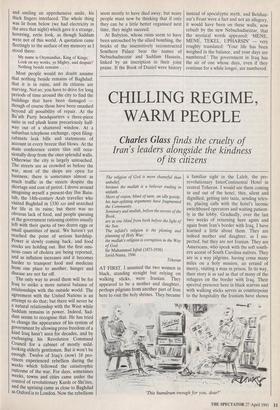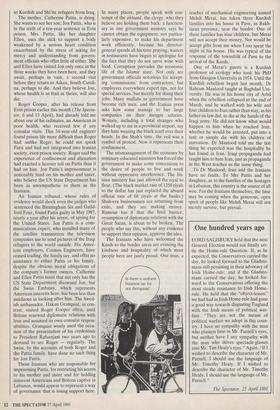CHILLING REGIME, WARM PEOPLE
Charles Glass finds the cruelty of
Iran's leaders alongside the kindness of its citizens
The religion of God is more shameful than unbelief, because the mullah is a believer trading in unfaith. . . Short of vision, blind of taste, an idle gossip, his hair-splitting arguments have fragmented the Community.
Seminary and mullah, before the secrets of the Book, are as one blind from birth before the light of the Sun.
The infidel's religion is the plotting and planning of Holy War; the mullah's religion is corruption in the Way of God. Sir Muhammad Iqbal (1873-1938) Javid-Nama, 1946 Teheran
AT FIRST, I assumed the two women in black, standing straight but relying on walking sticks, were Iranian. They appeared to be a mother and daughter, perhaps pilgrims from another part of Iran here to visit the holy shrines. They became a familiar sight in the Laleh, the pre- revolutionary InterContinental Hotel in central Teheran. I would see them coming in and out of the hotel, thin, silent and dignified, getting into taxis, sending telex- es, placing calls with the hotel's laconic switchboard operators and waiting patient- ly in the lobby. Gradually, over the last two weeks of returning here again and again from Iran's border with Iraq, I have learned a little about them. They are indeed mother and daughter, as I sus- pected, but they are not Iranian. They are Americans, who speak with the soft south- ern accent of South Carolina natives. They are in a way pilgrims, having come many miles on a holy mission, an errand of mercy, visiting a man in prison. In its way, their story is as sad as that of many of the refugees on the border with Iraq. Their spectral presence here in black scarves and with walking sticks serves as counterpoint to the hospitality the Iranians have shown `This humdrum enough for you, dear?' to Kurdish and Shi'ite refugees from Iraq.
The mother, Catherine Pattis, is dying. She wants to see her son, Jon Pattis, who is in the sixth of a ten-year sentence in Evin prison. Mrs. Pattis, like her daughter Ellen, uses the stick to support a body weakened by a serious heart condition exacerbated by the stress of asking for mercy and understanding from govern- ment officials who offer little of either. She and Ellen have visited Jon only once in the three weeks they have been here, and they await, perhaps in vain, a second visit before they return to Aiken, South Caroli- na, perhaps to die. And they believe Jon, whose health is as frail as theirs, will also die.
Roger Cooper, after his release from Evin prison earlier this month (The Specta- tor, 6 and 13 April), had already told me about one of his cellmates, an American in poor health, who received few if any consular visits. This 54-year-old engineer found prison life more difficult than Roger had: unlike Roger, he could not speak Farsi and had not integrated into Iranian society, even prison society. Roger said the experience of confinement and alienation had exacted a heavier toll on Pattis than it had on him. Jon Pattis's imprisonment is noticeably hard on his mother and sister, who believe the US State Department has been as unsympathetic to them as the Iranians.
An Iranian tribunal, whose rules of evidence would shock even the judges who sentenced the Birmingham Six and Guild- ford Four, found Pattis guilty in May 1987, nearly a year after his arrest, of spying for the United States. Jon Pattis is a com- munications expert, who installed many of the satellite transmitters the television companies use to send pictures of the Iraqi refugees to the world outside. His Amer- ican employers, Cosmos Engineers, have ceased trading, the family say, and offer no assistance to either Pattis or his family, despite the obvious moral obligations of the company's former owners. Catherine and Ellen Pattis insist that not only has the US State Department disowned Jon, but the Swiss Embassy, which represents American interests here, has been less than assiduous in looking after him. The Swed- ish ambassador, Hakan Granquist, in con trast, visited Roger Cooper often, until Britain renewed diplomatic relations with Iran and assumed its own consular respon- sibilities. Granquist wisely used the occa- sion of the presentation of his credentials to President Rafsanjani two years ago to demand to see Roger — regularly. The Swiss, by the accounts of both Roger and the Pattis family, have done no such thing for Jon Pattis.
Those Iranians who are responsible for imprisoning Pattis, for restricting his access to his mother and sister and for holding innocent Americans and Britons captive in Lebanon, would appear to represent a way of governance that is losing support here. In many places, people speak with con- tempt of the akhund, the clergy, who they believe are holding them back: a function- ary in one government ministry says he cannot obtain the equipment, not particu- larly expensive, to make his department work efficiently, because his director- general spends all his time praying; waiters in restaurants have begun to apologise for the fact that they do not serve wine with food. Corruption pervades the economic life of the Islamic state. Not only are government officials notorious for accept- ing 'commissions' from contractors, but employees everywhere expect tips, not for special services, but merely for doing their jobs. Many mullahs in government have become rich men, and the Iranian press asks how some manage to buy large companies on their meagre salaries. Women, including a total stranger who walked up to me in a provincial airport, say they hate wearing the black scarf over their heads. In the Shah's time, the veil was a symbol of protest. Now it represents their confinement.
The mismanagement of the economy by seminary-educated ministers has forced the government to make some concessions to the desire of people to live and work without oppressive interference. The fin- ance ministry has just allowed the riyal to float. (The black market rate of 1350 riyals to the dollar has just replaced the absurd official rate of 68 riyals at the banks.) Shah-era businessmen are returning from exile, and they are making money. Rumour has it that the final barrier, resumption of diplomatic relations with the Great Satan, is about to be broken. The people who say this, without any evidence to support their opinion, approve the idea.
The Iranians who have welcomed the Kurds to the border areas are evincing the kindness and hospitality of which most people here are justly proud. One man, a teacher of mechanical engineering named Mehdi Merai, has taken three Kurdish families into his house in Pave, in Bakh- taran province, near the border. One of these families has nine children, but Merai will not accept their money. Nor would he accept gifts from me when I too spent the night at his house. His was typical of the response of the townsfolk of Pave to the arrival of the Kurds.
One of Merai's guests is a Kurdish professor of ecology who took his PhD from Glasgow University in 1974. Until the Kurdish rebellion began last month, Dr Bahram Maulood taught at Baghdad Uni- versity. He was in his home city of Arbil when the rebellion collapsed at the end of March, and he walked with his wife and four children to Iran rather than stay, as his father-in-law did, to die at the hands of the Iraqi army. He did not know what would happen to him when he reached Iran, whether he would be arrested, put into a tent or simply die with his children of starvation. Dr Maulood told me the last thing he expected was the hospitality he has found in Iran. Iraqi propaganda had taught him to hate Iran, just as propaganda in the West teaches us the same thing.
To Dr Maulood, Iran and the Iranians have no faults. To Mrs Pattis and her daughter, as to the families of the hostages in Lebanon, this country is the source of all woe. For the Iranians themselves, the time may be coming when the generous, open spirit of people like Mehdi Merai will not merely survive, but prevail.



















































 Previous page
Previous page